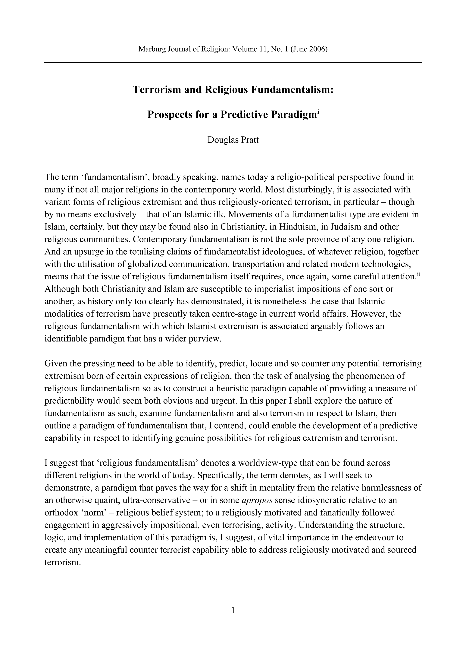Terrorism and Religious Fundamentalism: Prospects for a Predictive Paradigm
The term ‘fundamentalism’, broadly speaking, names today a religio-political perspective found in many if not all major religions in the contemporary world. Most disturbingly, it is associated with variant forms of religious extremism and thus religiously-oriented terrorism, in particular – though b...
Gespeichert in:
| 发表在: | Marburg Journal of Religion |
|---|---|
| 主要作者: | |
| 格式: | Artikel (Zeitschrift) |
| 语言: | 英语 |
| 出版: |
Philipps-Universität Marburg
2007
|
| 在线阅读: | 在线阅读 |
| 标签: |
添加标签
没有标签, 成为第一个标记此记录!
|
| 总结: | The term ‘fundamentalism’, broadly speaking, names today a religio-political perspective found in many if not all major religions in the contemporary world. Most disturbingly, it is associated with variant forms of religious extremism and thus religiously-oriented terrorism, in particular – though by no means exclusively – that of an Islamic ilk. Movements of a fundamentalist type are evident in Islam, certainly, but they may be found also in Christianity, in Hinduism, in Judaism and other religious communities. Contemporary fundamentalism is not the sole province of any one religion. And an upsurge in the totalising claims of fundamentalist ideologues, of whatever religion, together with the utilisation of globalized communication, transportation and related modern technologies, means that the issue of religious fundamentalism itself requires, once again, some careful attention. Although both Christianity and Islam are susceptible to imperialist impositions of one sort or another, as history only too clearly has demonstrated, it is nonetheless the case that Islamic modalities of terrorism have presently taken centre-stage in current world affairs. However, the religious fundamentalism with which Islamist extremism is associated arguably follows an identifiable paradigm that has a wider purview. |
|---|---|
| DOI: | 10.17192/mjr.2007.11.3619 |
 Publikationsserver
Publikationsserver